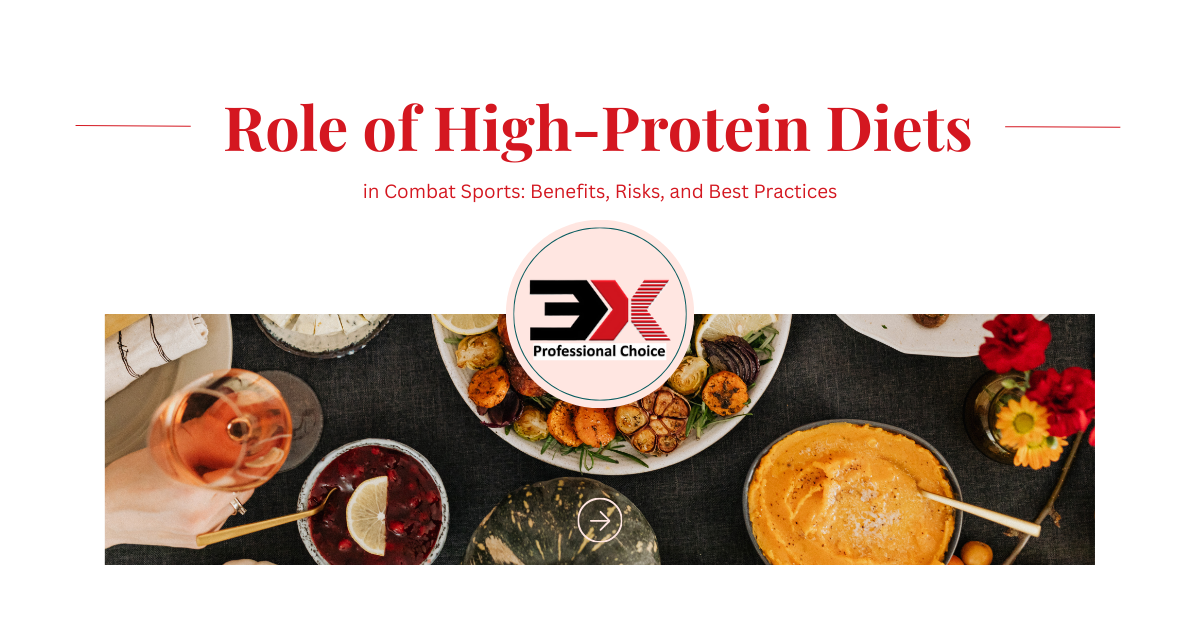Introduction to High-Protein Diets in Combat Sports
Combat sports—whether it’s boxing, MMA, wrestling, or jiu-jitsu—demand peak physical performance, sharp mental focus, and rapid recovery. One of the most debated nutrition strategies for fighters is the high-protein diet. Advocates argue it builds strength, speeds up recovery, and helps athletes maintain optimal body composition. But is more protein always better? Let’s break down the benefits, risks, and best practices for combat athletes considering a protein-rich diet.
Why Protein is Crucial for Combat Athletes
Muscle repair and recovery after training
Combat athletes endure grueling training sessions that cause microtears in muscle fibers. Protein provides the amino acids necessary to repair and rebuild these muscles, ensuring fighters recover faster between sessions.
Strength development and power output
Protein supports muscle growth, which is vital for explosive strength and striking power. Without sufficient protein, athletes risk losing muscle mass, especially when cutting weight.
Weight management and body composition
Fighters need to stay lean without sacrificing performance. A high-protein diet helps maintain muscle mass while reducing body fat, making it easier to hit weight class targets.
Recommended Protein Intake for Fighters
Daily protein requirements per body weight
Research suggests combat athletes benefit from 1.6–2.2 grams of protein per kilogram of body weight daily. For example, a 75 kg fighter should consume between 120–165 grams of protein per day.
Protein timing around training and recovery
Consuming protein within 30–60 minutes post-training enhances muscle recovery. Spreading intake evenly throughout the day is also more effective than eating a large portion in one meal.
Role of protein supplements (whey, casein, plant-based)
While whole foods should be the foundation, supplements can help fighters meet their needs. Whey protein is rapidly absorbed, making it ideal post-training, while casein digests slowly, supporting overnight recovery. Plant-based powders (pea, rice, hemp) are excellent alternatives for vegan athletes.
Benefits of High-Protein Diets in Combat Sports
Enhanced muscle recovery and reduced soreness
Protein accelerates recovery, reducing downtime between sparring sessions and strength training.
Improved performance and endurance
Athletes with adequate protein intake report higher stamina and reduced fatigue, crucial in late rounds of competition.
Fat loss and lean muscle preservation
Protein helps burn fat while preserving lean tissue—a must for fighters needing to make weight.
Better satiety and appetite control
High-protein meals keep fighters full longer, preventing unnecessary snacking and overeating.
Risks of Excessive Protein Intake
Kidney and liver health concerns
Contrary to myths, moderate high-protein diets don’t harm healthy kidneys. But excessively high levels over time may stress kidney and liver function, especially if an athlete has pre-existing conditions.
Dehydration and electrolyte imbalance
Protein metabolism requires more water. Fighters consuming very high protein without proper hydration risk dehydration, which can impair performance.
Digestive discomfort and nutrient imbalances
Too much protein can cause bloating, constipation, and limit intake of other vital nutrients like fiber and micronutrients.
Best Practices for Implementing a High-Protein Diet
Choosing quality protein sources
Opt for lean meats, poultry, fish, eggs, dairy, legumes, nuts, and seeds. Variety ensures a complete amino acid profile.
Balancing protein with carbs and fats
Carbs fuel explosive energy, while fats support hormone health. A balanced macronutrient approach ensures sustainable performance.
Hydration strategies for fighters
Combat athletes should increase water intake proportionally with protein consumption to avoid dehydration.
Customizing protein intake for weight classes
Athletes cutting weight may need higher protein to preserve muscle during caloric deficits. Nutrition plans should be individualized.
Sample High-Protein Meal Plan for Combat Athletes
Pre-training meals
- Option 1: Grilled chicken with quinoa and steamed broccoli
- Option 2: Greek yogurt with fruit, honey, and oats is the second option
- Option 3: Avocado and turkey sandwich on whole-grain bread
Post-training recovery meals
- Option 1: Almond butter and banana in a whey protein shake
- Option 2: Salmon with sweet potato and asparagus
- Option 3: Tofu stir-fry with brown rice and mixed vegetables
Snack and supplement ideas
- Cottage cheese with pineapple
- Hard-boiled eggs with whole-grain crackers
- Protein bars (low sugar, high fiber)
- Casein shake before bed for overnight recovery
Common Myths About High-Protein Diets
“High protein damages kidneys” myth
This concern mostly applies to individuals with existing kidney issues. For healthy athletes, research consistently shows that high-protein diets are safe and beneficial.
“Protein makes you bulky” myth
Building muscle requires more than just protein—it takes intense training, progressive overload, and sufficient calories. Protein alone won’t bulk you up unless you’re actively training for size.
“You need supplements to meet protein needs” myth
Supplements can help but aren’t essential. Most fighters can hit their protein goals through whole foods, with shakes used as a convenient backup.
FAQs on High-Protein Diets for Combat Athletes
Q1: How much protein should combat athletes eat daily?
Every day, the majority of combatants require 1.6–2.2 grams per kilogram of body weight.
Q2: Can fighters build muscle while cutting weight with a high-protein diet?
Yes—protein preserves lean mass, making it possible to maintain or even build muscle while losing fat.
Q3: Are plant-based proteins enough for fighters?
Absolutely. A combination of plant-based sources (lentils, beans, quinoa, tofu, pea protein) provides all essential amino acids.
Q4: What’s better post-training: whole food or protein shakes?
Both work. Shakes are convenient and fast-digesting, while whole foods provide additional nutrients.
Q5: Can high-protein diets affect endurance negatively?
Not if balanced with carbs. Fighters still need sufficient carbohydrates for explosive movements and sustained energy.
Q6: Is it safe to follow a high-protein diet long-term?
Yes, provided it’s balanced with other nutrients and hydration. Long-term studies show no harmful effects in healthy individuals.
Conclusion: Striking the Right Balance
For combat athletes, high-protein diets can be game-changing—supporting faster recovery, leaner body composition, and improved strength. However, too much protein without balance can backfire, causing dehydration or nutrient imbalances. The best approach is a customized nutrition plan tailored to training intensity, weight class, and personal health needs.
Keep in mind that while protein is a significant component, it is simply one part of the whole.. A winning fighter’s diet also includes the right balance of carbs, fats, micronutrients, and hydration strategies.
If you’re a fighter looking to optimize performance, consider consulting a sports nutritionist who can design a plan that fits your unique goals.

